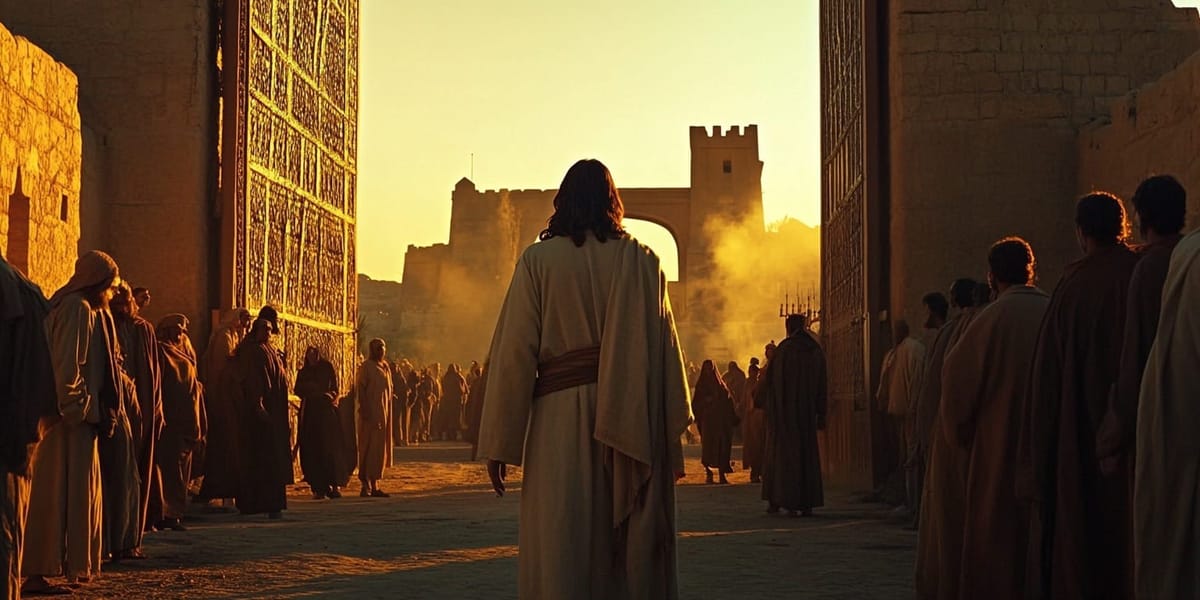Fairhaven Sermon 8-4-2024

Summary
In this week's service, Rev. Dylan Parson shared a personal reflection on his experiences as a runner, drawing parallels between the physical endurance required in a race and the spiritual endurance needed in the Christian faith. He spoke about his high school running days, where he transitioned from sprinting to long-distance running, experiencing both physical and mental challenges. This narrative led into the Apostle Paul's letter to the Ephesians, specifically chapter four, where Paul urges believers to "live as a people worthy of the call that you received from God." Rev. Parson emphasized Paul's pastoral approach, offering practical spiritual direction to the church in Ephesus and challenging them to live up to their calling in Christ.
Rev. Parson stressed the importance of collective growth and accountability within the church community. He highlighted the necessity of mutual support in spiritual development, referencing John Wesley's methodical approach to faith through small group meetings. These groups served as a means of ensuring accountability and growth among members, something that Rev. Parson hopes to revive in the fall with new small group initiatives. The sermon concluded with a call to action, encouraging congregants to recommit to their spiritual growth and to live lives worthy of their calling, supported by the church body as they strive for maturity in Christ.
Transcript
In high school, and regrettably no further than that, I always tell myself I'm going to start again, but who knows. I was a runner. I started running track in middle school. I was a sprinter at first, and I was okay.
You know? And if I'm honest, I think the reason that I started out sprinting was because the events are just so quick. You know, it's literally a sprint. At worst, whenever I was running the 400 meter, the longest sprint event, one of the hardest events in my opinion, it was done in like a minute or so. So the pain was relatively limited.
But by high school, I'd started cross country, and so I'd switched to long distance. And that consists of a 5K race, 3.1 miles, and it stretches over fields and hills, along trails and paths through the woods, open fields. And I was significantly better at this, but it was certainly much harder mentally.
You're suffering for the whole thing. You're huffing and puffing. Your legs are burning for something closer to 20 minutes, not one, as you strategize when to push, when to pass another runner, when to save a little bit of juice for the very end. There's a little bit of a mind game there too.
And it was very much a love-hate relationship for me. I have never, ever been the kind of person who just loves running because it feels so good, who enjoys it. Those people are nuts. Not even when I was putting in 40 miles a week.
I did not like it, and yet. I don't know. But there is nonetheless a deep thrill in every race. You blow past someone after pursuing them for a mile.
Feels great. You overtake a few people with a last-minute burst before the finish line. Just an amazing feeling. And my parents were always extremely supportive.
Always present at each race across Western PA. I ran in D10. So in Pittsburgh, you got the whip-yole, which is very compact. You don't have to travel that far for races.
But in District 10, my parents were traveling to Erie, Greenville, all the way around, almost out to Punxsutawney. My parents were always present, and they would jog from point to point along the course to cheer. And I appreciated that. I really did appreciate that.
My parents were some of the few that were always there. But my dad would drive me nuts. Let's go, Dylan. Pick up the pace.
Run faster. Push him. Pass him. Push.
Some positive cheering, you know. Let's go. Keep it up. Nice job.
I could accept that, you know. Nice job. I want to hear that. But being told what to do was infuriating.
I hated it. I am trying, Dad. I'm running as fast as I can. I'm doing my best.
Please shut up. And I'd complain to him about it when we got in the car. And what got me about it, I think, was this clear implication that I was not performing at the level of my ability, which no one wants to hear. When their lungs are on fire, when they're staring up a 200-yard hill.
But of course he was correct. He was right. Which is part of why it bothered me so much. I was almost always able to push harder, to set my mind to it, to improve my race over the previous week.
I was able to get ever closer to my potential. And so this morning we turn to the Apostle Paul in his letter to the church at Ephesus. We're in the fourth chapter here. We didn't read the first three.
We kind of jumped here. But he's switching direction in the letter. So this is how it starts. First of all, you can tell that he's switching direction by the use of therefore.
That's a classic Paul thing. He spent the first three chapters of Ephesians focusing on Christ and the nature of the church. He's speaking very mystical here. He's emphasizing that God has welcomed both Jews and Gentiles into the church.
Is uniting us together for the purpose of working out our salvation and reaching all the world. He's talking about how the church is God's chosen medium to change and save the world. So from chapter four onward, Paul is moving into something more practical. He's answering the question, Okay, so what? Now what does this practically look like? So keep in mind above all that Paul is a pastor himself.
He's writing to a congregation in the city of Ephesus. This is not a general book that he wrote to be part of the Bible. This is a pastoral letter to a real church. And he's giving practical spiritual direction to people who are still trying to figure out what it means to be Christian.
As the Ephesians have gotten this far in the letter, they're saying to themselves, Okay, we're followers of Christ. We are the church. So what are we supposed to be doing? What are you saying to us, Paul? Paul has made his case now for the relationship between Jesus, who's ascended now into heaven, and the church that remains below until he returns. Paul says that Christ is the head of the church and we're his body in the world, all the members, the arms, the legs.
And so now he leads with a really strong command to open chapter four. Therefore, as a prisoner for the Lord, Paul's in jail here in Rome, I encourage you to live as a people worthy of the call that you received from God. That, he says, is living with all humility and gentleness, with patience, bearing with one another in love, making every effort to maintain the unity of the spirit in the bond of peace. But the line that really pierces, I think, is that opener.
This is the NRSV. It's a little bit different. Lead a life worthy of the call to which you have been called. How does that make you feel? How do you receive that? Live a life worthy of the call to which you have been called.
I'll tell you that for me, it's kind of like I'm running a race and I'm hearing, Push! You can run harder! Push! And it stings, as it would have for the Ephesians, because I know quite well that, like my dad, Paul is right. We are called to be more than wherever we are. Are you living a life worthy of the call that Jesus has placed on you, that he has opened to you through his life, death, and resurrection for you? Are you living as the crucial part of Christ's body, the church that you are called to be? It's a heavy question, and it ought to feel kind of heavy. Jesus has called us, made us part of his body by grace alone, not because we worked for it, not because we are worthy of it, but are you living in such a way that you are trying to be worthy of all that you are called and freed to be in Christ? You've been pulled into the body of Christ as a gift to you, but are you making use now of that gift to the fullest? Paul is deeply committed to expressing something here that we often either forget or ignore that we've kind of lost.
The Christian life is both individual and collective. John Wesley famously said that there is no religion but social religion. So we're called to grow both as individual Christians, but also together as a body. One feeds into the other.
You help me grow in love, and I help you. You and I are able to become better followers of Christ, and then we become a stronger body, more able to do the will of Jesus in the world, who is our head. And the church, then, isn't just a place that we go to. It isn't one that we choose out of many because we like it, although we do like it here, right? It is a living, breathing body to which we belong that shapes you as you shape it.
You cannot be a Christian on your own. Listen to how Paul describes the various spiritual gifts and callings. He gave some apostles, some prophets, some evangelists, and some pastors and teachers. His purpose was to equip God's people for the work of serving and building up the body of Christ until we all reach the unity of faith and knowledge of God's Son.
The entire purpose of every gift that you or I may have is for one another, to equip the whole church in service and in growth until Jesus returns. And this sounds very pleasant, but Paul moves in this chapter to make clear that it's not just sunshine and roses and kumbaya, everyone working together in peace and harmony, right? Paul tells the Ephesian church and our church that we are striving to reach the unity of the faith and knowledge of God's Son. God's goal is for us to become mature adults, to be fully grown, measured by the standard of the fullness of Christ. That's what he says.
And that comes with expectations and accountability. That is, are you doing it or are you not? A key component of the church's job is to hold one another to that task of becoming mature adults in Christ, to affirm and support one another when we're actually working on it, and in Paul's words, to hear and speak the truth in love when we're off track. Almost no one in the church expects to be challenged, even lovingly. Paul says it's got to be lovingly, you're speaking the truth in love.
No one expects in the church to be challenged by their pastor, let alone their sibling in Christ. We want to hear, Good job from the sidelines, not, Pick up the pace. I know you can do better than that. I know that you are better than that.
But if we're one body, and there is no religion but social religion, we have no choice but to be actively invested in one another's spiritual growth and pursuit of holiness. That's inescapably part of being Christian. This is in Ephesians, this is all over the epistles. And it is the crucial piece of our Methodist tradition.
I'm not going to pour my whole trip into this sermon. I'm not. I've been very careful of that, but I want to talk about Wesley for a minute. You've heard me say this before, but this is how we get the name Methodist.
John Wesley led his people to be methodical in their faith. He had a routine that you were going to follow. You were regularly committing to pray, to fast, to visit the sick, the imprisoned, the needy, the old. And above all, above all, this was their thing.
To meet together every week, every week, in small groups called class meetings to check in on how it was going with each other and to push each other towards continued growth. That was the social part of social religion. And in Wesley's words, they watched over each other in love. So you meet with your group and you said last week, I've been having a lot of trouble keeping up in prayer, or I'm having a lot of anger against my neighbor.
They would check up on you next week. How's that going for you? And the whole goal was that you would have an answer, that I'm working with God on this, the Spirit's moving me in this way or that way, and here's how things are changing. And if you came back and nothing had changed, and nothing had changed, and nothing had changed, then how do we speak the truth in love to get you on a better track towards maturity in Christ? And you can see how that's a straight line from Paul telling the Ephesians to speak the truth in love. We have to build these spaces of trust where we can speak the truth in love.
Anyone who joined one of Wesley's class meetings, one of his groups, his societies, and wasn't interested in receiving constructive support was politely but firmly asked to leave and come back when they were ready. There's been a real revival of interest in the Wesleyan method for the last 40 years or so. For about 150 years, class meetings, these small groups had faded. I remember Mary Louise telling me, whenever I talked about this a couple years ago, she remembers her aunt talking about a class meeting.
Mary Louise is 94. It's been a long fade. And there's good reason for interest in this revival. David Lowe's Watson is a Methodist theologian and early pioneer of this revival, and he wrote in 1990 that every American Christian, see if this feels right, I think it does, seems to feel like we're missing something.
That there's a hole in our faith lives, but one we're having trouble locating. It's not more involvement in mission, he says, or learning more in Bible study. It's not a lack of action. It's not a lack of knowledge.
Definitely not that, though those things are great. It's good to be more involved in mission. It's good to go to Bible study. He says that the lack is a lack of collective, mutual accountability and growth in discipleship.
The exact thing that Paul is describing here to the Ephesians. So oftentimes we'll start coming to church, or we've been here our entire lives. We get confirmed as teens, join the church as adults, and then we totally plateau in growth and settle into routine instead. So it's no wonder, I think, that most kids seem to leave church after confirmation, or even in my experience, people will join the church and then rapidly kind of fall off over the course of the next year or two.
Kids leave after confirmation because they feel like they've graduated church. They feel like they've finished with all we have to offer them. Where do I go now? This is it. But that's not the kind of Christianity that Paul is describing.
Whether you've known Jesus for one year or 80 years, the question is, have you met God's goal for us to become mature adults? I bet not, because Paul has a pretty high standard for maturity. He says it's to be fully grown, measured by the standard of the fullness of Christ. And so are you as mature spiritually as Jesus Christ? Our whole journey of faith is a quest to be remade together in the image of Jesus himself, to become like Jesus in all of our thoughts and words and actions. There is always so much room to grow, and this is intended to be a major function of the church.
Again, listen to Paul in verse 15. By speaking the truth with love, let's grow in every way into Christ, who is the head. The whole body grows from him as it is joined together and held together by supporting ligaments. The body makes itself grow, that it builds itself up with love as each one does its part.
Our growth is not supposed to stall. You'll have moments, but it's not supposed to stall when we are still infants, he describes, who can be tossed and blown around by every wind that comes. You can do better than that. You can do better than where you are.
You can live as one worthy of the call you receive from God. So how might we become a church that builds one another up in this way, where we're ready to help one another grow and both offer and accept the hard truth about where we need to grow and change to make that growth happen? For one, here's my plug, we're going to restart our small groups in the fall. We had two that lasted about a year and a half. We're going to start them again, round two, in the fall.
And the purpose of those groups is exactly that. It's the same as the class meetings. So I'd ask you to start praying now about whether you need to join one, whether you should, whether you're ready to take a big step in discipleship. I'm happy to talk to you about that.
This is a revitalization of the thing that Wesley did. We had our first groups, we learned what worked well, what we need to change, we're going to try again. But outside of that, consider, God has given you a wondrous calling, one that lasts a lifetime and beyond. And so if you've plateaued in your faith and growth, if we together have plateaued in our faith and growth, let's change that and use your gifts to build up this body and be built up by it.
Run faster. I believe in you, God is saying. In a few minutes when we come to this communion table, I'd ask you to do it as a recommitment to living a life worthy of your calling. Growing in maturity in Christ.
We come to this table together. We eat this meal and run this race together. One Lord, one faith, one baptism, Paul says. One God and Father of all, who is over all, through all, and in all.
So hear Jesus and your brothers and sisters in Christ from all times and places, shouting to you on the sideline, pick up the pace. I know you can do better than that. In the name of the Father and the Son and the Holy Spirit. Amen.


